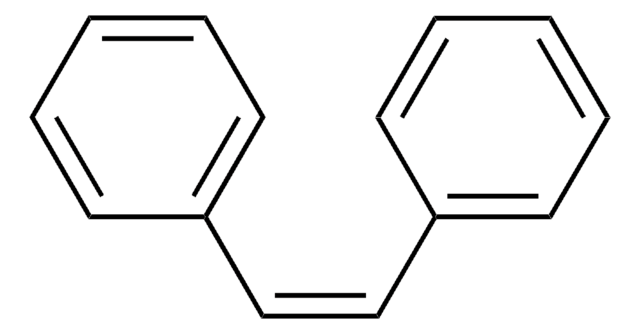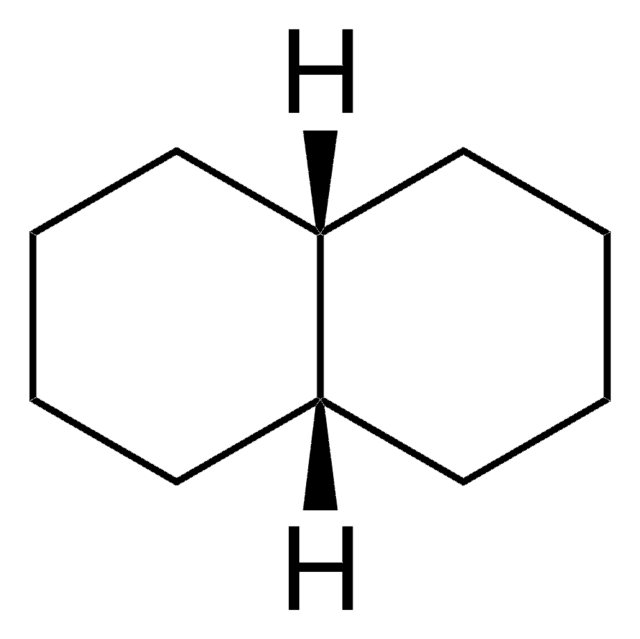161306
1,8-Nonadiyne
98%
Autenticatiper visualizzare i prezzi riservati alla tua organizzazione & contrattuali
About This Item
Formula condensata:
HC≡C(CH2)5C≡CH
Numero CAS:
Peso molecolare:
120.19
Numero CE:
Numero MDL:
Codice UNSPSC:
12352100
ID PubChem:
NACRES:
NA.22
Prodotti consigliati
Livello qualitativo
Saggio
98%
Stato
liquid
Indice di rifrazione
n20/D 1.449 (lit.)
P. ebollizione
55-55.5 °C/13 mmHg (lit.)
Punto di fusione
−21 °C (lit.)
Densità
0.799 g/mL at 25 °C (lit.)
Temperatura di conservazione
2-8°C
Stringa SMILE
C#CCCCCCC#C
InChI
1S/C9H12/c1-3-5-7-9-8-6-4-2/h1-2H,5-9H2
DMOVPHYFYSASTC-UHFFFAOYSA-N
Descrizione generale
1,8-Nonadiyne undergoes one-step hydrosilylation reaction for attaching acetylene-terminated alkyl monolayers to nonoxidized crystalline silicon surfaces.
Applicazioni
1,8-Nonadiyne was used as starting reagent in the synthesis of 2,6-hexadecadiynoic acid, 2,6-nonadecadiynoic acid and 2,9-hexadecadiynoic acid.
Avvertenze
Warning
Indicazioni di pericolo
Consigli di prudenza
Classi di pericolo
Eye Irrit. 2 - Flam. Liq. 3 - Skin Irrit. 2 - STOT SE 3
Organi bersaglio
Respiratory system
Codice della classe di stoccaggio
3 - Flammable liquids
Classe di pericolosità dell'acqua (WGK)
WGK 3
Punto d’infiammabilità (°F)
107.6 °F - closed cup
Punto d’infiammabilità (°C)
42 °C - closed cup
Dispositivi di protezione individuale
Eyeshields, Faceshields, Gloves, type ABEK (EN14387) respirator filter
Scegli una delle versioni più recenti:
Possiedi già questo prodotto?
I documenti relativi ai prodotti acquistati recentemente sono disponibili nell’Archivio dei documenti.
Néstor M Carballeira et al.
Lipids, 41(5), 507-511 (2006-08-29)
The hitherto unknown 2,6-hexadecadiynoic acid, 2,6-nonadecadiynoic acid, and 2,9-hexadecadiynoic acid were synthesized in two steps and in 11-18% overall yields starting from either 1,5-hexadiyne or 1,8-nonadiyne. Among all the compounds 2,6-hexadecadiynoic acid displayed the best overall antifungal activity against both
Benjamin S Flavel et al.
Langmuir : the ACS journal of surfaces and colloids, 29(26), 8355-8362 (2013-06-25)
Poly(ethylene glycol) (PEG) is one of the most extensively studied antifouling coatings due to its ability to reduce protein adsorption and improve biocompatibility. Although the use of PEG for antifouling coatings is well established, the stability and density of PEG
Stephen G Parker et al.
Nature communications, 9(1), 2288-2288 (2018-06-14)
For many normal and aberrant cell behaviours, it is important to understand the origin of cellular heterogeneity. Although powerful methods for studying cell heterogeneity have emerged, they are more suitable for common rather than rare cells. Exploring the heterogeneity of
Yan B Vogel et al.
Nature communications, 8(1), 2066-2066 (2017-12-14)
Predicting or manipulating charge-transfer at semiconductor interfaces, from molecular electronics to energy conversion, relies on knowledge generated from a kinetic analysis of the electrode process, as provided by cyclic voltammetry. Scientists and engineers encountering non-ideal shapes and positions in voltammograms
Janneke Veerbeek et al.
ACS applied materials & interfaces, 9(1), 413-421 (2016-12-10)
Silicon-based solar fuel devices require passivation for optimal performance yet at the same time need functionalization with (photo)catalysts for efficient solar fuel production. Here, we use molecular monolayers to enable electrical passivation and simultaneous functionalization of silicon-based solar cells. Organic
Il team dei nostri ricercatori vanta grande esperienza in tutte le aree della ricerca quali Life Science, scienza dei materiali, sintesi chimica, cromatografia, discipline analitiche, ecc..
Contatta l'Assistenza Tecnica.








